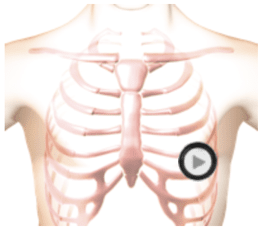This is an example of severe mitral stenosis which is most commonly due to rheumatic heart disease.
The first heart sound is decreased in intensity due to severe thickening of the mitral valve leaflets.
The second heart sound is normal and unsplit
Systole is silent.
There is an opening snap 50 milliseconds into diastole. As mitral stenosis becomes more severe, the opening snap will occur earlier in diastole.
The opening snap is followed by a low frequency murmur which occupies the remainder of diastole. The first two thirds of the murmur is diamond shaped and the remainder is a crescendo. Use the bell of the stethoscope to hear this murmur.
In the animation you can see the turbulent blood flow from the left atrium into the left ventricle. You can see the severely thickened mitral valve leaflets and the markedly enlarged left atrium. The excursion of the mitral valve leaflets is severely reduced.
Mitral Stenosis - Severe Audio


Technique

The patient's position should be supine left side down.
Auscultation Tips
S1:Decreased intensityDiastole:Opening snap then diamond shaped low-pitch murmur
Sound Wave
Observe Cardiac Animation
Review the animation and observe the turbulent blood flow from the left atrium into the left ventricle. You can see the severely thickened mitral valve leaflets and the markedly enlarged left atrium. The excursion of the mitral valve leaflets is severely reduced.
Authors and Sources
Authors and Reviewers
- ECG heart rhythm modules: Thomas O'Brien.
- ECG monitor simulation developer: Steve Collmann
-
12 Lead Course: Dr. Michael Mazzini, MD.
- Spanish language ECG: Breena R. Taira, MD, MPH
- Medical review: Dr. Jonathan Keroes, MD
- Medical review: Dr. Pedro Azevedo, MD, Cardiology
- Last Update: 11/8/2021
Sources
-
Electrocardiography for Healthcare Professionals, 6th Edition
Kathryn Booth and Thomas O'Brien
ISBN10: 1265013470, ISBN13: 9781265013479
McGraw Hill, 2023 -
Rapid Interpretation of EKG's, Sixth Edition
Dale Dublin
Cover Publishing Company -
EKG Reference Guide
EKG.Academy -
12 Lead EKG for Nurses: Simple Steps to Interpret Rhythms, Arrhythmias, Blocks, Hypertrophy, Infarcts, & Cardiac Drugs
Aaron Reed
Create Space Independent Publishing -
Heart Sounds and Murmurs: A Practical Guide with Audio CD-ROM 3rd Edition
Elsevier-Health Sciences Division
Barbara A. Erickson, PhD, RN, CCRN -
The Virtual Cardiac Patient: A Multimedia Guide to Heart Sounds, Murmurs, EKG
Jonathan Keroes, David Lieberman
Publisher: Lippincott Williams & Wilkin)
ISBN-10: 0781784425; ISBN-13: 978-0781784429 - Project Semilla, UCLA Emergency Medicine, EKG Training Breena R. Taira, MD, MPH
-
ECG Reference Guide
PracticalClinicalSkills.com
Mitral Stenosis - Severe | Auscultation Cheat Sheet with Sounds & Video | #98